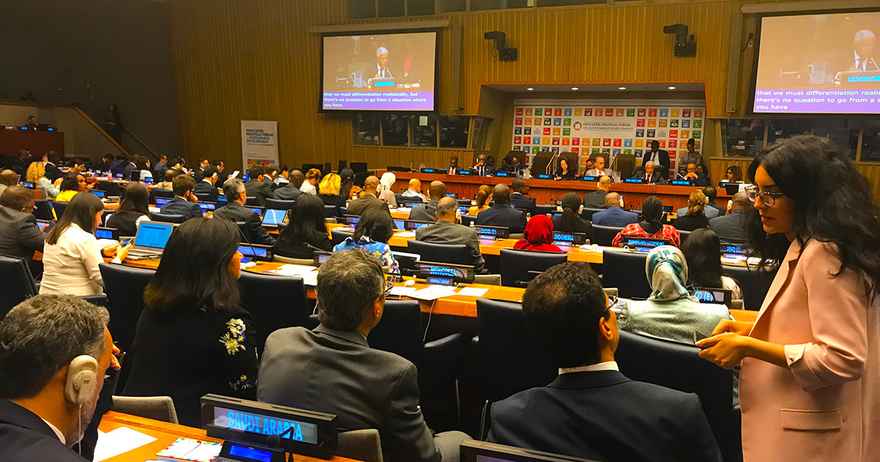SDG12 at the HLPF: Glocalised Adoption of Circular Economy

by May East
In the pursuit of constant growth, humanity is using natural resources at an unprecedented rate. Total global resource use has increased from six billion tonnes in 1990 to an unprecedented 60 billion today and per capita levels of resource consumption are at their highest level in history. Growing demand is outstripping raw material supply and it takes the planet 18 months to replenish the natural resources we consume in a year. Forecasts suggests that, based on current consumption levels and future population growth, we will need the equivalent of two Earths to support us by 2030.
By 2050, the world economy is expected to quadruple and the global population to grow from the current 7 billion to over 9.2 billion. The OECD Environmental Outlook to 2050 shows the additional strain that this will place on the earth’s material and energy resources and the environment. A growing population with higher than average income requires more food, more industrial products, more energy and more water. This creates formidable challenges for sustainable economic and environmental development.
For many of the EU Countries, SDG 12 will be one of the hardest to achieve as it speaks to the need for transformative change in the ways we produce, consume and generally live our lives.

One of the most stirring sessions of HLPF was on SDG 12 Responsible Consumption and Production, chaired by ECOSOC Vice-President Inga Rhonda King, and moderated by Elliot Harris, UN DESA.
Shashwat Sapkota, UN DESA, said the extraction of raw materials in developing countries is supporting unsustainable levels of per capita consumption and production in the developed world.
Keynote speaker Peter Thomson, UN Secretary-General’s Special Envoy for the Ocean, said SDG 12 lies at the heart of Agenda 2030 and the Paris Agreement, called for sustainability to be a core fiduciary responsibility for business and challenged the UN system to imbue SDG 12 across all its agencies. He stated we are living beyond our means.
Nur H. Rahayu, Ministry of National Development Planning, Indonesia, outlined national initiatives on eco-labelling and clean production.
Petra Bayr, Parliamentary Sustainable Development Committee, Austria, called for consumer tools to hold private and public sectors to account. In her passionate speech she stated that neoliberal capitalism does not respect planetary boundaries and advocated for international laws to hold the private sector accountable for human rights.
Jane Nyakang’o, African Roundtable on Sustainable Consumption and Production, described efforts to align SDG 12 with Africa 2063 and the green economy.
Ulf Jaeckel, Federal Ministry for the Environment, Germany, said that while a global framework on sustainable consumption and production (SCP) exists, the transition to SCP is a “huge wheel that turns very slowly”.
Lead discussant Amy Luers, Future Earth, highlighted two major challenges to SCP: it is a multi-sectoral issue requiring systemic thinking, and we have not identified the limits of our current economic system.
Jaeckel invited everyone to become part of the One Planet Network. Nyakang’o said the 10 Year Framework of Programmes on SCP should serve to bring stakeholders together. Bayr called for making a sustainable lifestyle “easy and sexy”.
The key messages of the sessions included:
- we are living beyond our means
- the challenge is multisectoral
- neoliberalism does not respect planetary boundaries
- we need to promote a mix of legislation & incentives
- we need a plan which leads us to a low carbon way of life, implemented with integrity
- glocalised adoption of circular economy
- SDG12 cannot be achieved without cross-sectoral and international partnerships and policy coherence
Each minute, 1 million plastic bags are used, typically for only 15 minutes, before being discarded, according to Plastic Oceans. Already a plastic-waste ‘continent’ floats in the Pacific Ocean and by 2050 there will be more plastics than fish in the oceans.
Industry’s voluntary measures are not sufficient (target 12.6). Legal measures must be taken against the plastics, oil, pesticide, electronics, agro- and chemicals industry who are the main polluters. They must be held accountable and be liable for the cost of pollution throughout the product life-cycle, and by phasing out subsidies which support perverse outcomes (target 12.C).
If you want to acquire skills and competences on how to re-design our human presence on the planet check Gaia Education Design for Sustainability course starting on 15 October 2018.


0 comments
Leave a comment